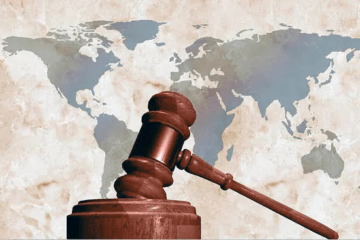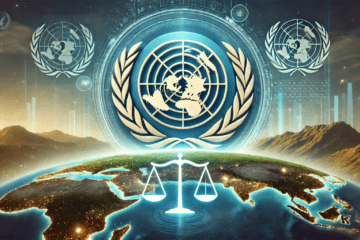
This article is written by Madhu Yadav of 2nd Year of B. A. LL. B of Amex Law College & Department of Law, Burdwan University, an intern under Legal Vidhiya
ABSTRACT
This research paper provides a comprehensive review of international law and its importance for business, exploring its impact on trade, investment, dispute resolution. The study investigates various aspects of international law, including treaties, conventions, and agreements, focusing on their influence on business transactions and operations.
This research highlights the importance of international law in promoting a stable and predictable business environment. It analyzes how international legal norms govern commercial contracts, intellectual property rights, and foreign investments, thus ensuring fair competition and protecting business interests across borders.
Moreover, the research examines the role of international organizations, such as the Word Trade Organization (WTO) and the International Chamber of commerce (ICC), in enforcing and interpreting international law for the benefits of business worldwide.
Keywords: International law, business, importance, trade, investment, regulations, dispute resolution, treaties, globalization, legal framework, cross-border transactions.
Introduction
International law plays a crucial role in shaping the global business landscape by providing a framework for conducting cross-border transactions, resolving disputes, and promoting stability and cooperation among nations. As businesses continue to expand their operations across borders, understanding and adhering to international law has become imperative for their success. This research explores the importance of international law for businesses, examining its key principles, benefits, and challenges. Furthermore, international law facilitates cooperation between nations through treaties and agreements, such as trade pacts and environmental accords. Businesses benefit from a more integrated global economy, reduced trade barriers, and standardized regulations across borders.
Meaning
- International laws are set of rules, agreements and treaties.
- Bind countries together.
- Independent system and exists outside the legal framework of a particular state.
Definition
According to professor Oppenheim “the body of customary and conventional rules which are considered legally binding by civilized states in their intercourse with each other.
Classic
Hackworth similarly defines: international law consists of body of rules governing the relations between states
Gray: international law or the law of nations is the name of body of rules which according to the usual definitions regulate the conduct of states in their intercourse with each other
Cobbett: international law may be described as the sun of the rules accepted by civilized states as determining their conduct towards each other, and towards each other’s subjects.
Modern definitions
Fenwick: international law may be defined in broad terms as the body of general principles and specific rules which are binding upon the members of international community in their mutual relations
Whiteman: he words others entities subject thereto may include international organisations, individuals and non-state entities
Starke: the definition of Starke takes into account the changing character of international law and truly reflects the present position of international law.
Schwarzenberger: international law is the body of legal rules which apply between sovereign states and such other entities as have been granted international personality.
Developments
1. *Climate Change Agreements: * The Paris Agreement, reached in 2015, continued to be a significant development. Countries committed to limiting global warming, and this has implications for various industries due to increased regulations, emissions standards, and sustainability requirements.
2. *Digital Economy and Data Protection: * As technology evolves, issues related to data protection, cybersecurity, and cross-border data transfers have gained prominence. Laws like the General Data Protection Regulation (GDPR) in the European Union have set the tone for data protection globally.
3. *Trade Agreements and Tariffs: * Trade tensions and negotiations between major economies (e.g., China-US trade war) have led to fluctuations in international trade laws and tariffs, affecting businesses’ global supply chains and market access.
4. *Human Rights Due Diligence: * The concept of corporate responsibility for human rights abuses in supply chains has gained attention. Various countries and international organizations are considering or implementing regulations to hold businesses accountable for such practices.
The Foundations of International Law:
International law encompasses a set of rules and principles that govern the conduct of states and international organizations in their interactions. These regulations emerge from treaties, customary practices, and the decisions of international courts and tribunals. For businesses, international law establishes a framework within which cross-border transactions, trade, and investments occur.
What is International Business law
International business law is a legal framework that governs commercial transactions and business activities conducted across national borders. It deals with the rules and regulations that businesses must adhere to when engaging in international trade, investment, contracts, and dispute resolution. It covers aspects such as international contracts, intellectual property rights, trade regulations, and cross-border taxation. Understanding international business law is crucial for companies operating in a global marketplace to ensure compliance and mitigate legal risks.
Types of international law frameworks
Three main types of international law exist.
Public International Law: Governs the relationships between countries and international organizations, dealing with issues like human rights, diplomacy, and the law of treaties.
Private International Law (Conflict of Laws): Addresses legal disputes involving individuals or businesses from different countries, focusing on issues like jurisdiction and choice of law.
Foreign law: is simply laws passed by foreign country that apply to all who do business there.
Importance of international law for business
International law plays a crucial role in shaping and regulating business activities in the global arena. It provides a framework for conducting business across borders, ensuring fair competition, protecting the rights of businesses and individuals, resolving disputes, and promoting economic development. The importance of international law for business can be summarized as follows:
Legal Certainty and Stability: International law establishes clear rules and regulations that businesses can rely on when engaging in cross-border transactions. This legal certainty helps create a stable and predictable environment for business operations, which is essential for making long-term investments and strategic decisions.
Cross-Border Transactions: In an increasingly interconnected world, businesses often engage in transactions with entities from different countries. International law governs these transactions, covering areas such as contracts, intellectual property rights, and trade regulations, facilitating smooth cross-border trade and investment.
Protection of Property and Intellectual Rights: International law provides protection for intellectual property rights, including patents, trademarks, copyrights, and trade secrets. This protection encourages innovation and incentivizes businesses to invest in research and development, knowing that their intellectual assets will be safeguarded globally.
Dispute Resolution: International law provides mechanisms for resolving disputes that may arise between businesses from different countries. This includes arbitration and international tribunals, which offer a neutral platform for parties to resolve conflicts outside the domestic legal systems.
Trade Regulations and Treaties: International law regulates international trade through agreements like the World Trade Organization (WTO) rules, regional trade pacts, and bilateral treaties. These agreements promote free trade, eliminate trade barriers, and ensure fair competition, benefitting businesses and consumers alike.
Corporate Social Responsibility (CSR): International law encourages businesses to operate responsibly and ethically. Companies are increasingly held accountable for their social and environmental impacts under various international frameworks, influencing their reputations and business practices.
Labor and Human Rights Protections: International law addresses labor and human rights standards that businesses must adhere to in their operations, including fair labor practices, non-discrimination, and protection against child labor and forced labor.
Environmental Regulation: Businesses operate within a global ecosystem, and international environmental law sets standards for pollution control, resource conservation, and sustainable practices, urging businesses to be environmentally responsible.
Investment Protection: International law includes bilateral and multilateral investment treaties that protect foreign investors from unfair treatment, expropriation, and discriminatory practices by host countries. This protection encourages foreign direct investment and contributes to economic growth.
Compliance and Reputation: Adherence to international law and standards enhances a company’s reputation globally. Businesses that demonstrate ethical conduct, compliance with international norms, and respect for human rights are more likely to attract customers, investors, and partners.
Case law
1. *The Lotus Case (France v. Turkey, 1927) *: This case is known for its principle of “lotus” jurisdiction, which emphasizes that states are free to exercise their jurisdiction unless prohibited by international law. It established the principle of territorial sovereignty and provided a basis for understanding when states can exercise jurisdiction over acts occurring outside their territory.
2. *Corfu Channel Case (United Kingdom v. Albania, 1949) *: This case dealt with the use of force and the principle of innocent passage in territorial waters. It highlighted the responsibility of states to ensure safety in international waters and the rights of ships to transit peacefully.
3. *Nuremberg Trials (1945-1946) *: The Nuremberg Trials were a series of military tribunals held to prosecute major war criminals of Nazi Germany. These trials established the principle that individuals can be held accountable for international crimes, including crimes against humanity, war crimes, and genocide.
4. *Trail Smelter Arbitration (United States v. Canada, 1941) *: This case involved a transboundary pollution dispute between the United States and Canada. It contributed to the development of the principle of international environmental liability and highlighted the need for cooperation in preventing cross-border environmental harm.
5. *Nicaragua v. United States (1986) *: The International Court of Justice (ICJ) ruled in favor of Nicaragua, stating that the United States had violated international law by supporting Contra rebels and mining Nicaraguan harbors. This case clarified principles related to the use of force and state responsibility.
6. *Gabcikovo-Nagymaros Case (Hungary v. Slovakia, 1997) *: This case dealt with a dispute over a dam project on the Danube River. The ICJ ruled on issues related to environmental protection, sustainable development, and the concept of equitable utilization of shared water resources.
7. *Tadic Case (1995) *: The International Criminal Tribunal for the Former Yugoslavia (ICTY) dealt with this case, which was instrumental in establishing the definition and prosecution of war crimes, crimes against humanity, and genocide under international law.
8. *Pinochet Case (1998) *: The arrest of former Chilean dictator Augusto Pinochet in the UK and subsequent legal proceedings highlighted the principle of universal jurisdiction for certain international crimes and the possibility of trying heads of state for such crimes.
9. *Armed Activities on the Territory of the Congo Case (Democratic Republic of the Congo v. Uganda, 2005) *: The ICJ clarified principles regarding state sovereignty, non-intervention, and the prohibition of the use of force in this case involving the Democratic Republic of the Congo and Uganda.
10. *South China Sea Arbitration (Philippines v. China, 2016) *: The Permanent Court of Arbitration ruled on maritime disputes in the South China Sea, clarifying the legal status of certain features, territorial claims, and the validity of China’s “Nine-Dash Line.”
Conclusion
International law provides a framework that promotes responsible and sustainable business practices, ensures fair competition, and contributes to the growth of a globalized economy. Businesses that understand and comply with international legal principles are better positioned to succeed in the complex and diverse international marketplace.
References:
- International business law, available at https://study.com/learn/lesson/international-business-law-overview-systems.html
- Types of international law frameworks, available at https://study.com/learn/lesson/international-business-law-overview-systems.html
- Importance of business law, available at https://online.york.ac.uk/business-across-borders-the-importance-of-international-business-law/
- Development, available at https://blog.oup.com/2020/01/top-eight-developments-in-international-law-2019/
- The Lotus Case (France v. Turkey, 1927)
- Corfu Channel Case (United Kingdom v. Albania, 1949
- Nuremberg Trials (1945-1946)
- Trail Smelter Arbitration (United States v. Canada, 1941)
- Nicaragua v. United States (1986)
- Gabcikovo-Nagymaros Case (Hungary v. Slovakia, 1997)
- Tadic Case (1995)
- Pinochet Case (1998)
- Armed Activities on the Territory of the Congo Case (Democratic Republic of the Congo v. Uganda, 2005)
- South China Sea Arbitration (Philippines v. China, 2016




0 Comments